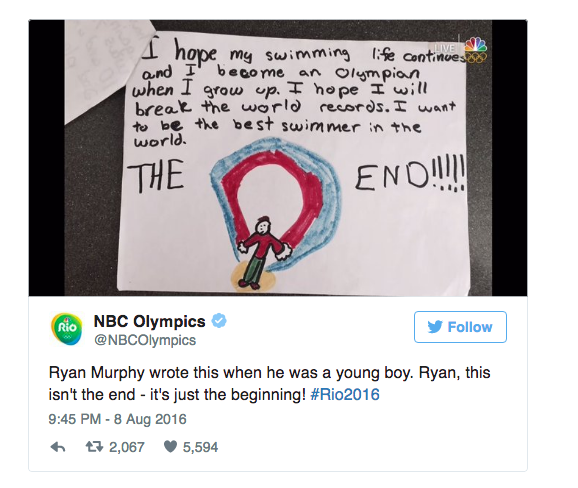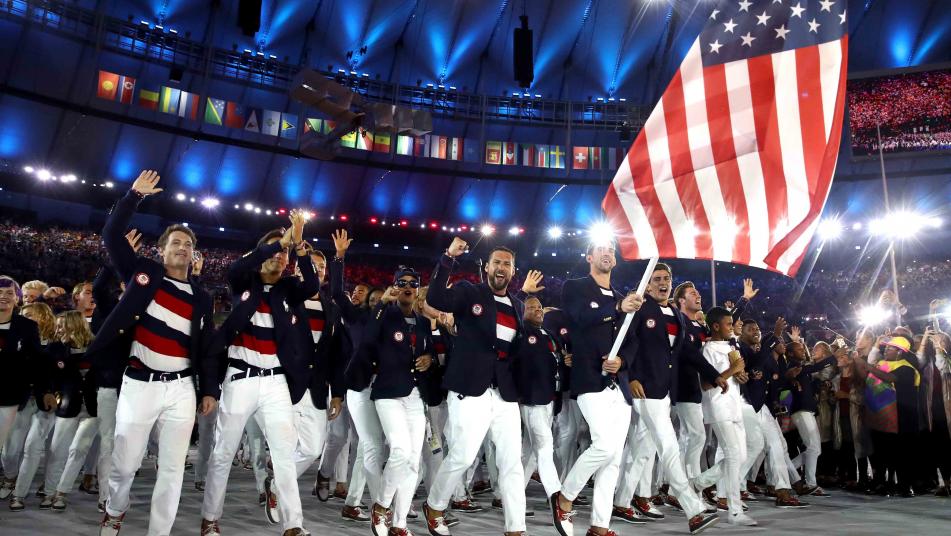 I LOVE the Olympics. Always have. My grandmother missed out on swimming the butterfly leg of the IM relay in the 1940 games that were cancelled due to World War II. My 11th birthday fell right in the middle of the Lillehammer Games and my mom, of course, led the charge with an Olympics-themed party. The whole world is watching Rio right now, which led me to wonder – what have I learned from the Olympics as a mom? So, here are my top Rio ’16 takeaways so far.
I LOVE the Olympics. Always have. My grandmother missed out on swimming the butterfly leg of the IM relay in the 1940 games that were cancelled due to World War II. My 11th birthday fell right in the middle of the Lillehammer Games and my mom, of course, led the charge with an Olympics-themed party. The whole world is watching Rio right now, which led me to wonder – what have I learned from the Olympics as a mom? So, here are my top Rio ’16 takeaways so far.
Moms IN the Olympics:
- Moms ON the podium. This is an awesome list of 10 mothers on the U.S. team. One of the moms profiled is swimmer Dana Vollmer. After being put on bedrest for 7 weeks and gaining 50lbs while pregnant with son Arlen, she came back and won a silver in the 4×100 free relay and a bronze in the 100 fly in Rio. Cyclist Kristin Armstrong won a gold in the cycling time trials in Beijing, London and Rio. She had son Lucas in 2010, between Beijing and London. Finally, volleyball star Keri Walsh Jennings was actually 5 weeks pregnant (and wearing a bikini!) when she took gold in London!
- Sportsreference.com lists 18 known instances of pregnant Olympic competitors. My personal favorite was Malaysian sports shooter Nur Suryani Taibi who competed 8 months pregnant in London! (Did you know that East German athletes in the 1970s were accused of ‘abortion doping’? They were intentionally impregnated in order to benefit from increased red blood cell production to enhance their athletic performance).
- Age is just a number. Uzbekistani gymnast Oksana Chusovitina won a gold medal in 1992 before many of her current competitors were even born. She is competing in her seventh Olympic games in Rio at the age of 41 against athletes who are younger than her 17 year old son, Alishar.
Moms OF Olympians:
- Mom love. Most athletes, when interviewed, talk about their moms and the rest of their families as support systems over the years. Early mornings at the pool, long weekend trips to gymnastics meets, and the inevitable crowd shot of the spectator agony. Moms get their minute of fame by through their unwavering pride and love.
- Great commercials. I’m talking to you, P&G. “Thank you, Mom” gets me every. single. time.
- Families are all different. I love learning the back stories for each of the athletes profiled. Hearing about Simone Biles’ parents, Michael Phelps’ fiancé and son or seeing rugby player Kelly Griffin’s beautiful family, it is a reminder that there is no one mold for what a family is.
For us ‘normal’ folks, as moms, watching the Olympics:
- It’s a GREAT way to learn about flags and geography. My 5 1/2 year old son is obsessed with figuring out where all of the athletes are from based on their uniforms and the three letters next to their name. It is also a great opportunity to discuss geography and similarities among flags of similar regions or why certain countries aren’t heavily represented in the summer Olympics. There are tons of great iPad apps to support this if your littles are interested!
- It is a reminder that we are all human – despite our political views or religion, we are all human. The selfie taken by members of the North and South Korean gymnastics teams sums it up pretty well:

- It provides a platform to discuss cheating. I haven’t watched a single broadcast without mention of doping and the slew of Russian athletes (nearly 1/3 of their team!) who were banned from competition. Conversations about ethics, especially in sports, are difficult but can be age-appropriate for even our youngest of athletes.
- It validates my
desireneed to save all photos, videos, and drawings of my boys playing sports, you know, just in case… See Ryan Murphy’s proclamation from age 8: (What if someone had tossed that into the garbage?!)

- Math. Oh, the math! The middle school teacher in me squeals when we see the medal count, statistics during the opening ceremony about population, or that time my son commented, “Wow! There are four people on a relay team and they each get a medal? They’ll need twelve medals for all of the swimmers on the podium.” We’ve loved discussing why is it the goal of some sports (decathlon, soccer, volleyball, diving…) to get high numbers (of points) but the lowest numbers (as times in minutes/seconds) win in sports like track and field and swimming.
- Winning is not expected. Winning is not common. Winning is not easy. These athletes (who have already defied the odds by even making the Olympics!) can train for years and miss out on a medal by a few hundredths of a second or, like leading cyclist Annemiek van Vleuten experienced, a crash. Winning is about resiliency, perseverance, overcoming obstacles and dealing with inevitable failure. We must point this out to our children explicitly so they can reference it in their own lives, especially in our ‘everyone gets a trophy’ society.
- It is okay to cry. Even Michael Phelps, while winning his TWENTIETH medal cried on the podium. He was, no doubt, thinking about the ups and downs he has experienced (and we’ve all read about in US Weekly…), the sacrifices of his family and eyes of the world watching him. Tears are totally appropriate.
- It’s beautiful to see super competitive individuals (sometimes on rival teams during their regular seasons) come together – as legs of relays, teammates on the field, or cheering each other on from the stands, it’s amazing to see these athletes march together in the same uniforms during the opening and closing ceremonies.

What is YOUR favorite part of the Olympics?

























